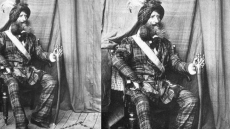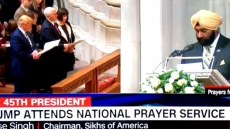After making a name in the world of Punjabi literature, an octogenarian poet, short-story writer and editor is now seeking to promote more collaborative ventures among Punjabi authors so that they get a better deal.
He feels the authors should get a fair remuneration if they are to keep writing and producing quality work. The publisher, on the other hand, should promote literary writings by teaming up writers of the same stature.
"I think it is high time for publishers to help promote collaborative publications of literary works by encouraging four or more writers of a particular language to write collectively," poet S. Swarn, who turned 80 last November, told IANS in an interview while on a visit here.
Based in Mumbai since the 1950s, he was candid in the belief that "let's think of solutions to help the growth of great Punjabi literature instead of applauding a neo-culture of paying from your pocket to the publisher to get the material published".
He was in Chandigarh for a commemorative event in his honour by the Punjab Kala Parishad, designed to showcase achievements of Punjabi cultural personalities after they have crossed 75 years of age, an idea initiated by the celebrated Berlin-based writer Rajvinder Singh.
Rajvinder Singh also edited a book, containing Swarn's poems and short stories and articles written on him by friends, which was released on the occasion.
Swarn, a name in Punjabi literature for publishing "Chetna", a legendary bi-monthly magazine of Indian literature that was once published in Punjabi for over a decade, believes that while earnings of the authors are going down, those of publishers are increasing.
Favouring collaborative fiction, he said a collective of writers aims to weave together a novel and that too a shorter work.
In western countries, he said, collaboratively written works have been paying handsomely and have even been the subject of academic research.
The literary journey of Swarn, which translates into gold in Punjabi, began with the launch of "Chetna" in 1955 from Bombay (now Mumbai).

It was the platform for upcoming writers to promote literary journalism, he said.
He was also associated with the Indian People's Theatre Association, an over six-decade-old performing arts group, and the Punjabi Kala Kender, founded in 1973 in Bombay by noted actor Balraj Sahni.
Swarn was the Kender's secretary for many years and got to work closely with film personalities and writers like Balraj Sahni, Gulzar, Ramanand Sagar, Sagar Sarhadi and A.K. Hangal, among others.
In 1959-60, Swarn, who also penned Punjabi plays that were staged in Bombay and Delhi, shifted "Chetna" magazine to Delhi.
The magazine was closed in July 1965. After that Swarn, a successful entrepreneur too, launched India's first techno-economics electronics monthly journal Electronics Today in 1968. It closed down two years ago.
Swarn, who was involved in environmental activities, especially beach cleaning, by founding the NGO Versova Development Organisation, started writing at the age of 15. At that time, he was in Benaras (now Varanasi) in Uttar Pradesh.
The inspiration to write got ignited when he started participating in spiritual poetry contests being organised by a local gurdwara where his brother was employed.
"This is how I started my literary journey. Later in my life, I drifted to leftist ideology. I was once also a member of the Communist Party of India," he said.
"After 1965 (with the closure of "Chetna"), I have not written poems or any other literary work," Swarn said, adding: I tried many a time to start penning Punjabi literature but circumstances didn't allow that."
The Punjab Kala Parishad and Rajvinder Singh, who is a three-time German poet laureate, will continue this commemorative event twice a year, with renowned Punjabi novelist Jaswant Singh Kanwal being next in line.




